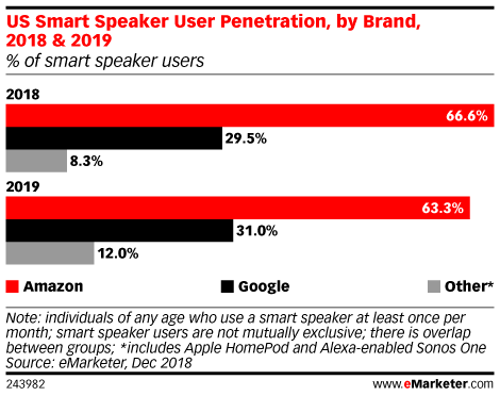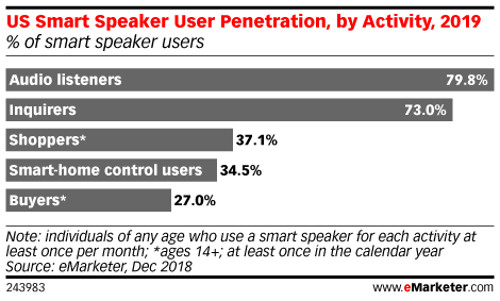Amazon’s Share of Smart Speakers Projected to Drop in 2019

The forecast also finds combined sales of smart speakers from Sonos, Apple, and other smaller players increasing to 12% in 2019, up from a current collective share of 8.3%.
Meanwhile, the overall smart-speaker arena is expected to experience a healthy 15% increase with a projected 74.2 million people owning and using smart speakers by the end of 2019 — accounting for more than a quarter of (26.8%) of U.S. adults.
“Google has the Home Mini and Home Hub to compete with Amazon’s Echo Dot and Echo Show, and both the Apple HomePod and Facebook Portal will experience their first holiday season this year,” explained analyst Jaimie Chung.
“Amazon has remained relevant by plugging Alexa into premium speakers like the Sonos, but even Sonos plans to bring Google Assistant to its devices next year, keeping the two companies neck and neck in the voice assistant race,” she added.
Despite the growing capabilities of smart speakers, people still tend to use them for basic functions such as listening to music or podcasts, catching up on the news, getting weather and traffic updates, and asking general questions, according to eMarketer’s research.

More than a quarter (27%) of smart-speaker owners are expected to use the speaker’s voice assistant to actually buy products in 2019 but in terms of dollars those purchases will account for a tiny portion of overall U.S. ecommerce sales. In 2018, “voice commerce” will account for just over $2 billion in sales, which is only 0.4% of domestic ecommerce sales.
“We still don’t see a lot of people shopping and buying with smart speakers yet, but this may change if more lower-cost models begin to incorporate screens,” observed principal analyst Victoria Petrock. “We’re also likely to see people doing more things with their voice assistants as they find their way into cars and other home-based devices.”
























































